Spider-Man Preview
Spider-Man is coming to the PC, and we get to try out the latest build.
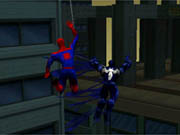
Games based on comic books typically haven't done very well on the PC, and as a result, there's been an obvious lack of comic book game releases over the past couple of years. Activision wants to break the drought with a PC port of the popular console game, Spider-Man--a game that was originally developed by Neversoft, the same company responsible for the Tony Hawk's Pro Skater series. Spider-Man makes the jump to the PC look easy, and carries over the strong gameplay that made the console version so successful. If anything, comic book fans might be surprised by how closely it adheres to the original comic book's style and storyline, as very few liberties have been taken to adapt Spidey into a full 3D world. However, as with most console-to-PC ports, the full 3D world that you crawl and swing through may seem a little dated--Gray Matter, the development team working on the PC version of Spider-Man, hasn't had the time to make any significant graphics upgrades, except to boost the resolution. Find out more in our interview with members of the team later in this preview.
Spider-Man begins in the classic comic book style--a small crime is committed, but as you quickly find out, it's only a part of a much larger crime about to take place. During a speech given by Dr. Octavius, Spider-Man swoops down onto the stage and steals the device that he's been legitimately promoting. Of course, Peter Parker--the real Spider-Man--sees this and starts to pursue the doppelgänger, but Parker is not the only one. Eddie Brock, also known as the symbiotic Venom, also gives chase, and only makes the real Spider-Man's life more difficult. As Spider-Man, you have to swing your way through more than 30 levels to uncover a plot involving many of Spider-Man's most well-known enemies, such as the Rhino, Mysterio, and Dr. Octopus. But you also receive help from some of Spidey's allies and see some familiar faces from other Marvel Comics series.
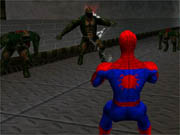
Though the game marks Spider-Man's first entry into a full 3D world, it's probably more successful at capturing the essence of the Spider-Man comic book--you leap off tall skyscrapers, free-fall for a second or two, fire one of Spidey's webs, and then watch as he glides across the sky from building to building. Indeed, even watching the manner in which Spider-Man climbs up and down the buildings is so authentic that it's obvious the original developers are huge fans of the series and went through a great effort to make sure all of Spider-Man's movements and mannerisms were as close to the comic book as possible. But as fun as it is to fly across the skies, nothing is more fun than actually using some of Spider-Man's attacks, which--in conjunction with a heavy stealth element--really add some depth to the game.
Does Whatever a Spider Can
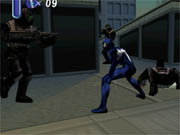
Your first few minutes in the Spider-Man version of New York are no doubt going to be spent testing out Spidey's swinging and climbing abilities, but the real fun starts when you get to attack unsuspecting villains. In addition to an assortment of vicious kick-and-punch combinations, Spider-Man has a few different web attacks. The most basic attack, and one that works only on the weakest enemies in the game, is the web entangle, which involves firing a constant stream of webbing at enemies until they're completely trapped. Again, this attack usually takes out weaker enemies entirely, but in the later levels, you can use this technique only as a quick delay tactic. Conversely, Spidey's most powerful attack is the web ball--a large ball of webbing that dishes out a surprising amount of damage. This attack drains your web cartridges rapidly, so you can't use it constantly, but it certainly helps if you find yourself trapped in a corner. In this type of situation, Spidey has a specifically designed attack--he can form a web shield around himself and make it explode into shards that do damage to all enemies in the area.
Some attacks can even be used in combination with each other: For example, you can use the basic web attack to pull your enemies in close and then use Spider-Man's punching or kicking attacks to finish them off, or you can entangle enemies in some webbing to prevent them from moving and then use the web ball attack. There are a surprising number of methods for dealing with the most basic enemies, but as you progress through the game, you'll have to learn how to use Spider-Man's most valuable ability: stealth.
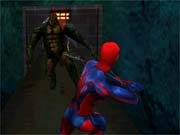
Having the ability to walk on walls and ceilings gives you a huge advantage over some enemies because you're able to jump out of view within a few seconds. There's even a web zip-line ability that lets you shoot directly at a wall or a ceiling to instantly pull yourself in a specific direction. In most cases, using wall-crawling effectively can make the game much easier. In one early level, you have to rescue hostages from inside a bank, but the problem is that if the enemies see you attempting to rescue hostages, they either shoot you or shoot the hostages, forcing you to restart the level. But by staying out of view on the ceilings and using your web to entangle enemies, you can safely rescue each of the hostages. Other situations don't require you to be quite as stealthy, but taking your enemies by surprise and striking the initial blow definitely helps.
The latest build of Spider-Man looks just about complete. With the exception of some visual glitches, all the levels look like they're ready to go. All the gameplay elements--including the secret bonuses, such as new costumes for Spider-Man and the comic book covers--are in the current build. We had a chance to ask CEO Mike Livesay and Lead Programmer Jason Maynard of Gray Matter a few questions about the impending release of Spider-Man for the PC.
Q&A With Gray Matter
GameSpot: Can you tell us about the team working on Spider-Man for the PC?
Mike Livesay: LTI Gray Matter is the developer for Spider-Man PC, and the team consists of Jason Maynard (lead programmer); Daniel Zahn and Chris Robbers (programmers); Russ Truelove (artist); and Mike Livesay (CEO/lead programmer).

GS: It's been a while since a Spider-Man game has appeared on the PC. How do you think the PC audience will react to seeing this new incarnation of the popular comic book figure?
Jason Maynard: I imagine they will react quite well to this Spider-Man game. There have been rapid advancements in computer technology, especially in 3D hardware acceleration, so this will be the best-looking Spider-Man game out for the PC as far as I know. The ability to explore the 3D environments using Spider Man's wall-crawling and web-swinging abilities make the game all the more fun.
GS: What will make Spider-Man stand out from previous comic-to-game translations that typically haven't done very well on the PC?
JM: I think the comic lovers will like how closely the game remains true to the comic book series, from the villains and allies that make appearances to the history of the comic book issues provided in the shell of the game. The original developers went through a lot of effort to translate Spider-Man's comic book world accurately into the video game industry. The game's plot is interesting, and the controls are easy to learn, so even if people have never heard of Spider-Man before, they could still enjoy playing this game. In other words, it should appeal to a very broad market base.
GS: Villains play an obvious role in the game, but there are a number of friendly faces as well. Who are Spider-Man's allies in the game, and how do they help him out?
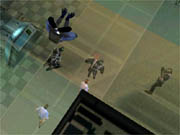
JM: Probably the most prevalent ally in the game would be Black Cat, a longtime friend of Spider-Man who even knows his true identity. Black Cat will help Spider-Man the most by offering tips in the first couple of levels, a feature that is especially helpful to first-time players of the game. Other allies in the game include Human Torch, Dare Devil, and Captain America. Oftentimes, they help Spider-Man out the most by just listening to his problems and offering their advice--after all, what are friends for?
GS: What improvements are being made upon the PlayStation version of the game?
JM: The PC version will contain an improved set of character models that use higher polygon counts and 16-bit textures. The PC version of the game will support higher resolutions and display color depths (depending on what the hardware has to offer). The sound quality will also be improved; all sound samples will be in 44.1KHz format. And last but not least, the controls for the game will be completely customizable; keyboard and joystick/gamepad controllers will be supported. The mouse will be used too, but only in the [game menus].
GS: Are there plans to address any of the problems that were prevalent in the original version, like occasional awkward camera angles?
ML: Unfortunately, scheduling demands didn't allow us the time to address the camera angles. Spider-Man PC is very important for Activision, and the ship date is cast in stone at this point. However, if by some miracle we have some extra time, we'll certainly look into improving it.
GS: What stage are you at in development right now, and when do you expect the game to be complete?
ML: The game is entering beta testing as we speak and is scheduled to code release in August. You should see it in stores by summer 2001.
GS: Thanks for your time.
Got a news tip or want to contact us directly? Email news@gamespot.com
Join the conversation